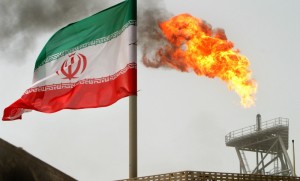 Iran�will offer foreign partners incentives to find and pump more crude and natural gas and will pay some fees in barrels as it seeks to boost income once international sanctions are lifted.
Iran�will offer foreign partners incentives to find and pump more crude and natural gas and will pay some fees in barrels as it seeks to boost income once international sanctions are lifted.New contracts that the country is developing will offer higher fees for riskier exploration and production projects, oil-ministry officials said at a conference in Tehran today. Local and international executives are attending the two-day meeting that started yesterday to discuss rules that would govern oil and gas production if Western curbs on Iranian energy exports are removed. The committee revising the Islamic republic�s contract model presented new terms called the �Iran Petroleum Contract.�
�We�ve analyzed all the contracts in the market right now, all available, beneficial models, and this is what we�ve come up with,� Mehdi Hosseini, a government energy adviser who leads the ministry committee, said at the conference. �This is a good model, with flexibility.�
Iran, a member of the Organization of Petroleum Exporting Countries, is discussing limits to its nuclear program in exchange for the removal of Western sanctions on its financial and energy industries. It agreed with six world powers on Feb. 20 to start negotiations next month that may achieve a long-term nuclear accord before a six-month interim deal expires. The U.S. and its allies believe Iran may be seeking to develop atomic-weapons technology, a claim that Iran denies.
Energy Payments
Under the proposed terms, state-run National Iranian Oil Co. will form joint ventures for crude and gas production with international companies to manage projects, provide financing and maximize hydrocarbon recovery, Hosseini said. Partners conducting exploration projects will be paid for their work with a share of the output, according to presentations at the conference.
�Ownership of the reservoirs belongs to the people, so ownership is never possible to be transferred,� Hosseini said. �The ownership of the produced oil can be negotiated,� he said, adding that the government wanted to offer contracts that will help develop long-term relationships with partners.
International companies will act as the sole operator at oil and gas exploration blocks and will be responsible for the risks of those projects. NIOC, as the state firm is known, may be a technical partner in the developments.
Investment Priority
Fees paid to international companies will be linked to the oil price and determined on a sliding scale, with riskier developments paying more, Hosseini said. Iran is giving priority to investment in common fields shared with neighboring countries such as Iraq and Qatar, and work on those deposits will be remunerated at the higher rate. The contracts will include incentives for extending the life of fields and the recovery rate for oil and gas.
Future partners will be able to recover all development costs linked to exploration and the start of production. They will be offered exploration rights in nearby areas if they find no oil or gas in a block where they�ve been working.
Iran is seeking to gain technical expertise by joining foreign companies in the projects and will require training for local nationals to boost local capabilities in the industry.
The Middle East nation has the world�s largest gas reserves, estimated at 1,187 trillion cubic feet, and the fourth-biggest�oil deposits, at 157 billion barrels, according to BP Plc�s Statistical Review published in June 2013.
Sanctions have almost closed Iran�s oil and gas fields to investment over the last decade, limiting access to technology needed to boost output and build export plants for liquefied natural gas. The constraints have cut oil exports by about half, according to the�International Energy Agency.
By Bloomberg
The Iran Project is not responsible for the content of quoted articles.










